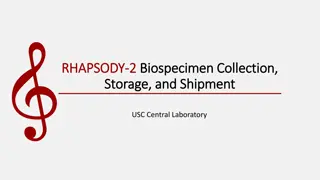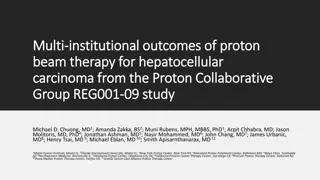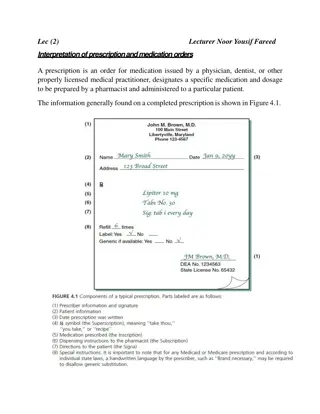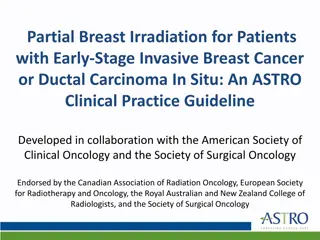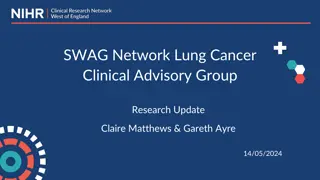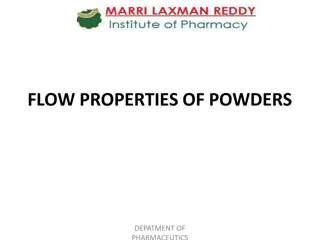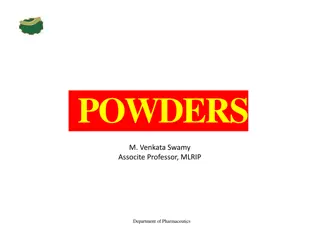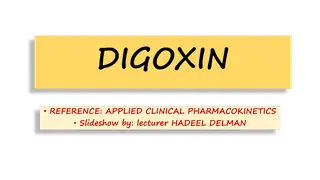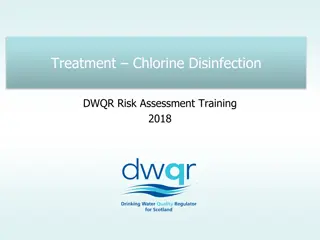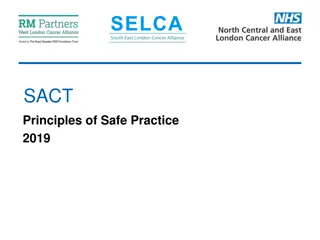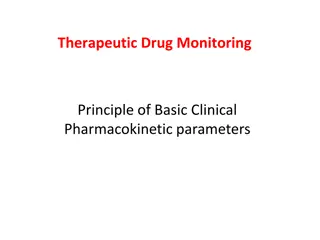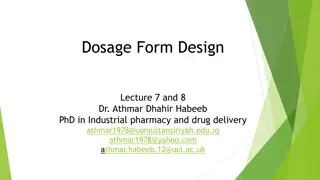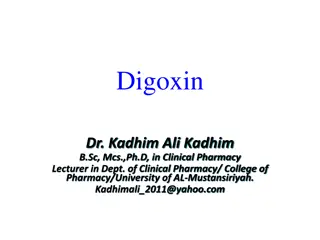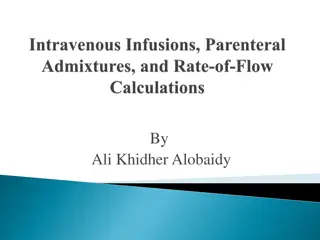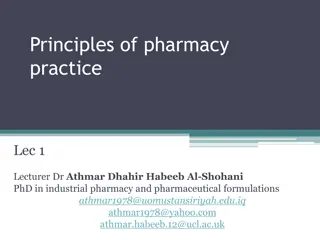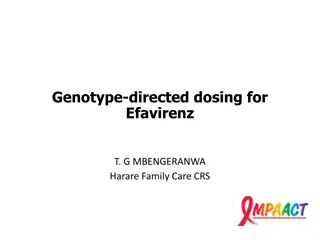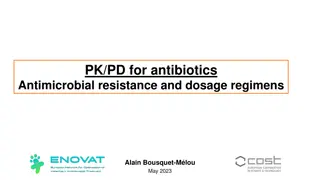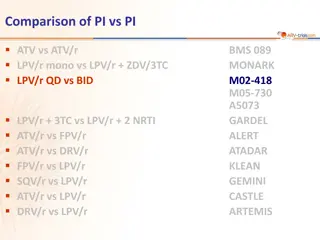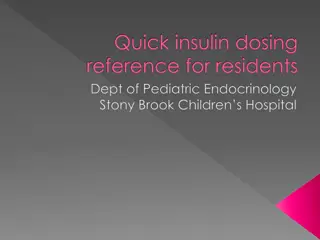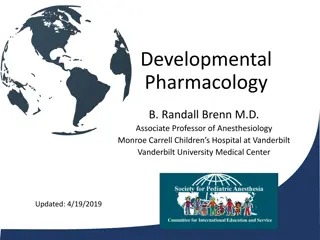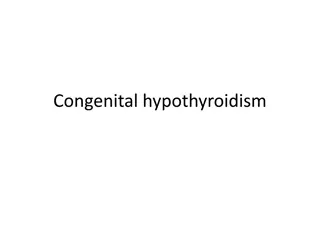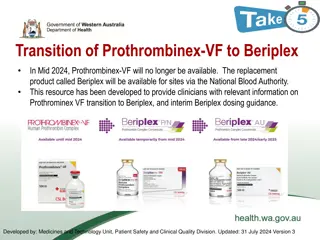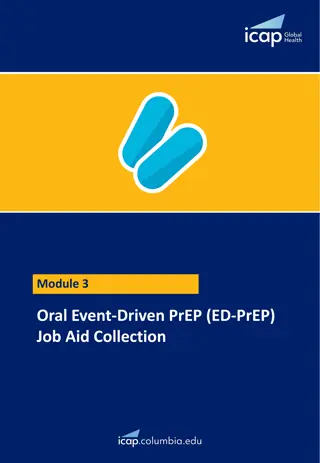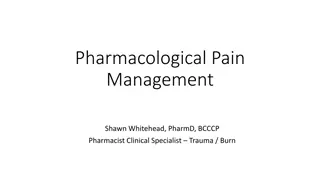Radiation Therapy for Gynecologic Malignancies - Comprehensive Overview
These slides serve as a valuable resource on radiation therapy for gynecologic malignancies. Key topics covered include radiation delivery techniques, indications for therapy, how radiation works, dosing considerations, and more. Suitable for radiation oncologists, ob/gyn residents, and gynecologic
5 views • 64 slides
Biospecimen Collection, Storage, and Shipment Overview at USC Central Laboratory
This overview covers the types of biospecimens collected, specimen collection schedule, supplies, protocols, and shipping instructions at the USC Central Laboratory. It includes details on whole blood collection for different assays, storage procedures, and shipment to USC Labs and Charles River Lab
0 views • 21 slides
Antibiotic Adaptation in Renal Insufficiency - Dosage Adjustments and Risks
Understanding the importance of adapting antibiotic therapy in patients with renal insufficiency is crucial to ensure efficacy and minimize risks. This content covers various factors influencing antibiotic selection, dosing adjustments based on patient parameters, and the risks associated with inapp
0 views • 52 slides
Proton Beam Therapy Outcomes for Hepatocellular Carcinoma: Multi-Institutional Study
This study by the Proton Collaborative Group evaluates the outcomes of proton beam therapy for hepatocellular carcinoma across multiple institutions. Factors such as liver tolerance, baseline function, and prior therapies were considered in the treatment of liver cancer. The study emphasizes the imp
0 views • 22 slides
Understanding Medication Orders and Prescriptions
A prescription is a crucial order for medication issued by medical practitioners, specifying medication details for a specific patient. This includes dosage, patient information, and may require compounding by pharmacists. Different types of prescriptions exist, such as those for single-component pr
4 views • 11 slides
Efficacy and Safety of Ferric Carboxymaltose for Heart Failure with Iron Deficiency
Iron deficiency is prevalent in heart failure patients with reduced ejection fraction and is linked to poor outcomes. The HEART-FID trial investigates the impact of intravenous ferric carboxymaltose (FCM) on all-cause mortality, heart failure hospitalizations, and exercise capacity in chronic HFrEF
1 views • 17 slides
Understanding Posology in Pharmacology: Factors Affecting Drug Dosage
Posology, the science of determining drug dosage, is influenced by various factors including age, sex, body weight, route of administration, and more. Changes in pharmacokinetics with age, differing drug responses in men and women, and the importance of body weight in dosing are crucial consideratio
6 views • 23 slides
Understanding Aminoglycoside Antibiotics and Dosing Strategies
Aminoglycoside antibiotics are potent but require precise dosing due to variability among patients. Suggested dosing adjustments based on serum concentrations can ensure therapeutic levels without toxicity. Various methods, like linear pharmacokinetics, individualized dosing, and computerized progra
16 views • 71 slides
Theresa S. Clark - Diabetes Educator Program Coordinator
Theresa S. Clark, MS, RD, LD, CDE, BC-ADM, is a dedicated Diabetes Educator and Program Coordinator at the Diabetes Resource Center in Hopkinsville, KY. She specializes in insulin therapies and teaches patients about insulin administration, carbohydrate counting, and mealtime insulin dosing. Certifi
1 views • 50 slides
Food Packaging Equipment Market Poised to Achieve $25.37 Billion
Meticulous Research\u00ae - a leading market research company, published a research report titled \u201cFood Packaging Equipment Market by Type (Form-fill-seal Equipment, Cartoning Equipment, Filling & Dosing Equipment, Wrapping & Bundling Equipment, Case Packing Equipment), Application, and Geograp
1 views • 4 slides
Partial Breast Irradiation Guidelines for Early-Stage Breast Cancer
This guideline developed in collaboration with various oncology societies offers recommendations for partial breast irradiation (PBI) in patients with early-stage invasive breast cancer or ductal carcinoma in situ. It covers patient selection criteria, techniques for delivering PBI, dosing, and trea
1 views • 27 slides
Latest Research and Studies on Lung Cancer - Update May 2024
This research update includes information on national recruitment to lung cancer studies, comparison of national vs. regional recruitment, and detailed descriptions of various studies and trials related to lung cancer. The studies cover areas such as treatment advancements, observational studies, ma
2 views • 13 slides
Understanding Bioidentical Hormone Replacement Therapy
Bioidentical Hormone Replacement Therapy (BHRT) involves using compounded hormones that are chemically identical to the hormones in the human body. Customized compounded bioidentical hormones offer flexible dosing based on individual needs, with growing clinical validation for hormone optimization.
1 views • 12 slides
BlueStep Medication Management Guide
Guide on managing medication in the BlueStep system, including entering prescribed medications, adding additional timing for multiple dosing, discontinuing medications, and setting medication prompts. Learn how to input custom prompts and temporary warnings efficiently.
0 views • 15 slides
Understanding Powder Flow Properties in Pharmaceutics
Powder flow properties play a crucial role in pharmaceutical manufacturing processes. Free-flowing or cohesive powders can lead to various challenges like uneven flow, caking during storage, and issues in dosing uniformity. Testing methods such as Carr's compressibility index and Hausner ratio help
0 views • 19 slides
Pediatric Dosage Calculations: Safe Medication Administration Guidelines
Learn how to calculate safe pediatric dosages for common medications such as Acetaminophen, Augmentin, Amoxicillin, and Ferrous Sulfate. Follow step-by-step instructions to determine the correct amount of medication to administer based on a child's weight and prescribed dosage. Ensure accuracy in do
1 views • 5 slides
Understanding Powder Dosage Forms in Pharmaceutical Compounding
Powder dosage forms offer flexibility and chemical stability but can be time-consuming to prepare, especially for unpleasant-tasting or hygroscopic drugs. Factors like particle size, density, humidity, and settling affect dosing accuracy. Methods like trituration and pulverization help in size reduc
4 views • 33 slides
Digoxin Pharmacokinetics and Clinical Considerations
This presentation covers the pharmacokinetic parameters, dosing guidelines, therapeutic and toxic concentrations, and factors affecting digoxin clearance and distribution. It explores how digoxin clearance is linked to creatinine clearance, usual dosing regimens for adult patients, and disease state
0 views • 41 slides
Essential Guidelines for Chlorine Disinfection in Water Treatment
Learn about the usage and key points to watch for when implementing chlorine disinfection in water treatment processes. Understand the effectiveness, dosing methods, safety considerations, and monitoring protocols to ensure successful water disinfection. Proper handling of hypochlorite solution, mon
1 views • 7 slides
Safe Practice Principles for Systemic Anti-Cancer Therapy (SACT) 2019
Systemic Anti-Cancer Therapy (SACT) involves chemotherapy and targeted agents for cancer treatment. Risks include errors with non-accredited staff, incomplete prescriptions, incorrect dosing, and patient education deficiencies. Safe practice principles emphasize specialist care, established protocol
0 views • 25 slides
Understanding Therapeutic Drug Monitoring and Clinical Pharmacokinetic Parameters
Therapeutic Drug Monitoring (TDM) utilizes pharmacokinetic principles to optimize drug therapy by balancing efficacy and toxicity levels. Historical background reveals a shift from empirical dosing to precise pharmacokinetic analysis, aiming to minimize toxicity risks and maximize therapeutic benefi
0 views • 47 slides
Essential Concepts in Dosage Form Design
Understanding the formulation and design of dosage forms is crucial in pharmaceutical sciences. Drug substances are combined with nonmedicinal agents to create stable, effective, and safe products. Considerations such as compatibility, quality control, labeling, and storage play key roles in dosage
4 views • 35 slides
Understanding Digoxin Pharmacology and Clinical Use
Digoxin, a cardiac glycoside, is utilized in managing congestive heart failure and atrial fibrillation due to its inotropic and chronotropic effects on the heart. It functions by inhibiting Na,K-ATPase, leading to increased intracellular calcium concentrations and augmented myocardial contractility.
5 views • 23 slides
Understanding Fluconazole: Mechanism, Spectrum, and Clinical Applications
Explore the mechanism of action, spectrum of activity, pharmacokinetics, and clinical uses of fluconazole. Learn about its role in treating various fungal infections, including candidiasis, cryptococcosis, and dermatophytosis, while being aware of resistance issues and dosing considerations.
0 views • 30 slides
Clinical Pharmacy Laboratory DM and Insulin Dosing Regimens
This comprehensive content covers various insulin dosing regimens used in clinical pharmacy laboratories for patients with diabetes mellitus. It includes examples of dosing regimens before meals and at bedtime, methods of insulin administration, vial images, mixing of different types of insulin, and
0 views • 14 slides
Understanding Intravenous Infusions: Types and Administration
Intravenous infusions are sterile pharmaceutical solutions or suspensions administered via different routes into the body for various medical needs. These infusions, such as D51.2NS, play a crucial role in providing essential nutrients and medications to patients. Intravenous administration sets and
0 views • 23 slides
Biomedical Recommendations for Doxycycline Post-Exposure Prophylaxis
This clinical guideline discusses the use of doxycycline post-exposure prophylaxis (PEP) to prevent bacterial sexually transmitted infections (STIs) such as syphilis, chlamydia, and gonorrhea. It provides evidence-based recommendations for offering doxy-PEP to individuals engaging in condomless sex
0 views • 10 slides
Principles of Pharmacy Practice - Drug Dosing Guidelines and Measurements
Understanding drug dosing is crucial in pharmacy practice. This lecture covers various aspects of doses, including adult and pediatric doses, dosage regimens, median effective and toxic doses, loading and maintenance doses, and prophylactic and therapeutic doses. Dose measurements in institutional s
0 views • 16 slides
Genotype-Directed Dosing for Efavirenz in Children Study
The study focuses on genotype-directed dosing of Efavirenz in children with HIV, aiming to optimize treatment options and dosages based on genetic factors. It explores the challenges in treating children with HIV, especially in resource-limited settings, and discusses the impact of genetic variation
0 views • 21 slides
Enhancing Quality of Life for Individuals with No Adrenals: Insights from GoodHormoneHealth Webinar
Discover key insights on managing life without adrenals, including discussions on adrenal hormones, optimal replacement strategies, necessary tests, stress dosing, and more. Explore the roles of the adrenal glands, hormones such as cortisol and aldosterone, and the Renin-Angiotensin-Aldosterone Axis
0 views • 55 slides
Optimizing Antibiotic Therapy for Pathogenic Bacteria and Resistance
Understanding the pharmacokinetic/pharmacodynamic relationships in antibiotic therapy is crucial for maximizing effectiveness against bacteria while minimizing resistance. Different bacterial loads and stages of infection require tailored dosing regimens to achieve optimal outcomes. Monitoring antim
0 views • 35 slides
Antibiotic Prophylaxis in Perioperative Care
Explore the rational approach to perioperative antibiotic use, the importance of antibiotic stewardship in the operating room, and guidelines for selecting and administering antibiotics to prevent surgical site infections. Understand when antibiotic prophylaxis is necessary, which antibiotics to use
0 views • 44 slides
Comparing Efficacy of LPV/r QD vs. BID in Combination Therapy
Study M02-418 compared once-daily (QD) and twice-daily (BID) LPV/r in combination with TDF and FTC for HIV treatment. The primary endpoint was achieving HIV RNA <50 c/mL at week 48, aiming for non-inferiority of QD vs. BID dosing. Patient characteristics, treatment response at week 48, and pharmacok
0 views • 7 slides
Pediatric Endocrinology Insulin Dosing Guide
Comprehensive reference for insulin dosing in pediatric endocrinology, covering onset, peak, and duration of action of various insulin preparations, guidelines for twice-daily dosing, managing Dawn Phenomenon and rebound hyperglycemia, and tips for multiple daily injections. Includes information on
0 views • 13 slides
Pediatric Pharmacology Considerations and Challenges
Developmental pharmacology in children involves unique considerations such as drug metabolism, urine concentration, and muscle relaxant dosing. The field faces challenges with limited drug testing in pediatric populations, emphasizing the importance of age-appropriate pharmacotherapy. Factors like d
0 views • 39 slides
Optimal Management Strategies for Congenital Hypothyroidism
Congenital hypothyroidism requires early diagnosis and prompt treatment initiation for optimal outcomes. Factors influencing treatment success include the age of starting treatment, severity of hypothyroidism, starting dose of medication, and ongoing monitoring of thyroid levels. Studies suggest tha
0 views • 11 slides
Transition from Prothrombinex-VF to Beriplex: Information and Guidance
In mid-2024, Prothrombinex-VF will be replaced by Beriplex, with the transition occurring in two stages. Beriplex P/N will be interim until Beriplex AU is available, with identical compositions. Clinicians are provided with dosing guidance for Beriplex, and the WA Anticoagulation Chart has been upda
0 views • 7 slides
Understanding Eligibility for Event-Driven PrEP (ED-PrEP)
Explore eligibility criteria and dosing guidelines for Event-Driven PrEP (ED-PrEP), a preventive medication regimen for individuals at substantial risk for HIV infection. Learn who is eligible, dosing instructions, and how to determine eligibility through specific questions.
0 views • 16 slides
Understanding GHB, GBL, and 1,4 BD: Types, Effects, and Risks
GHB and GBL, known as G drugs, are controlled substances impacting brain receptors similar to alcohol. They induce varying effects such as euphoria, relaxation, and sedation. Overdosing on these drugs can be life-threatening due to their fine margin between desired effects and toxicity. Combining G
0 views • 12 slides
Comprehensive Overview of Pharmacological Pain Management Strategies
This comprehensive overview covers various aspects of pharmacological pain management, including behavioral measures for patients unable to self-report pain, building pain regimens, NSAIDs use and associated risks, NSAIDs and COX selectivity, clinical presentation of pain symptoms, gabapentinoids fo
0 views • 22 slides

